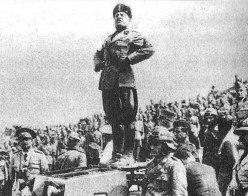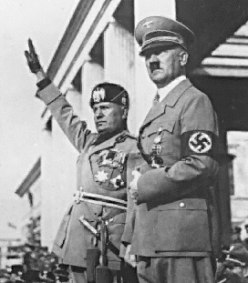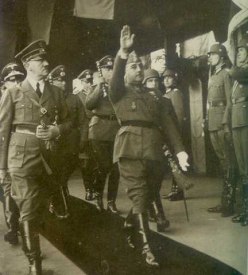Mussolini Struts Out
In 1922 Benito Mussolini seized power in Rome and introduced the world to fascism, the latest in brutally authoritarian, racist, anti-socialist dictatorships.
Italian Fascism violently suppressed working-class organisations at home and a lusted after imperialist expansion abroad.
Perceived ‘subversives’ were silenced through state censorship and a single, unchallengeable view of the world was imposed by a ministry of propaganda.
By 1925, any semblance of democracy had been dispensed with, and Mussolini’s mass movement of street thugs, known as Blackshirts for their distinctive attire, beat up political opponents, shut down left-wing newspapers and generally crushed all dissent.
Having exchanged liberal democracy for an authoritarian police state, Mussolini dreamt of imperial glory, and a new Roman Empire extending into the Mediterranean and Africa. Fascist Italy invaded Libya, Abyssinia and Albania, mercilessly crushing lightly armed local resistance with Mussolini’s mechanised war machine, all in a bid to to make Italy “great,respected and feared”.

Germany 1933
Hitler Let Loose
In 1933, Adolf Hitler’s Nazi party came to power in Germany. His political ambitions, future war aims and racial theories had been laid out in his book ‘Mein Kampf’. Germany’s problems, Hitler claimed, were ’caused by the Jews’. To survive, Germany had to to ‘expand to the east’ and displace the ‘lesser Slavic peoples’ who lived there. This was Germany’s right, as the home of the ‘the Aryan Master Race’.
Hitler started his political life as an embittered Corporal in the trenches of the First World War. When Germany was defeated in 1918 and subjected thereafter to humiliating victory conditions, Hitler swore revenge.
The National Socialist German Worker’s Party, or Nazis for short, formed with this vengeful aim in mind. Fuelled by a bitter hatred of Jews and communists, and liberally employing the street thug terror popularised by Mussolini’s Blackshirts, they quickly made their mark in a Germany wracked by unemployment and post-war discontent. In 1923, Hitler’s Nazis launched a failed coup d’etat. It was crushed, Hitler was arrested and then imprisoned, but this unfortunately gave him the time to write down his ideas in literary form.
By 1933, Hitler’s fortunes had reversed. His party was elected to power after a fierce campaign that played to the lowest racial prejudices of the German people and promised national glory.
As Hitler’s totalitarian power grew, Nazi Germany rearmed and expanded, opponents were rounded up, beaten, imprisoned and eliminated, and other nations were compelled to find political or military solutions within a generation of the so-called ‘War to end all wars’.



